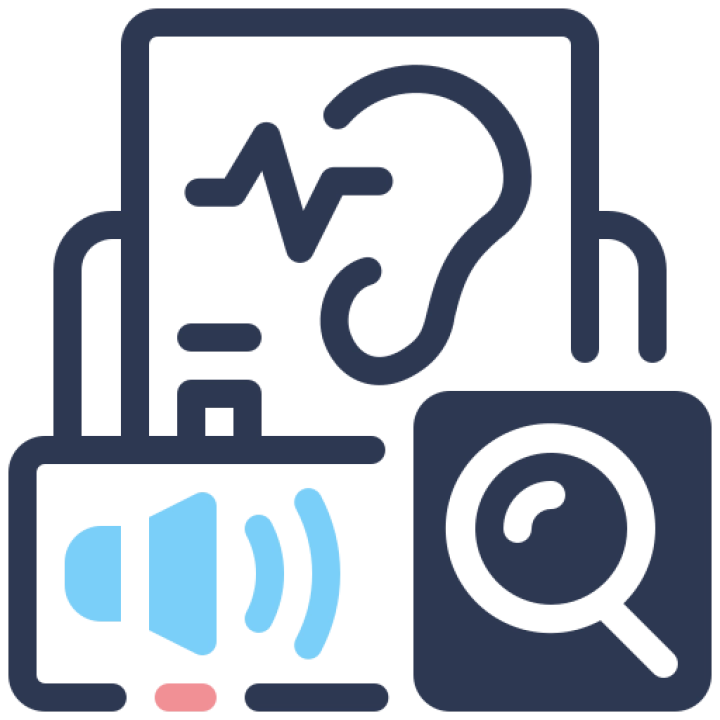College: Health Sciences
The Audiology major focuses on diagnosing, treating, and managing hearing and balance disorders and related conditions. Students develop skills in auditory assessment, hearing aid fitting, cochlear implants, and rehabilitation strategies. Graduates are prepared to work as audiologists in hospitals, clinics, private practice, and educational institutions.
Learning Objectives:
- Understand the fundamentals of audiology and hearing sciences.
- Develop skills in auditory assessment and diagnostic techniques.
- Learn techniques for fitting and programming hearing aids and cochlear implants.
- Explore principles of auditory rehabilitation and counseling.
- Analyze and interpret auditory data and patient needs.
- Develop critical thinking, problem-solving, and clinical skills for effective audiology practice.
Main Curriculum:
- Introduction to Audiology
- Overview of key concepts, principles, and practices in audiology.
- Basics of hearing science, anatomy of the ear, and the auditory system.
- Auditory Assessment
- Principles of auditory assessment, including pure tone audiometry, speech audiometry, and impedance audiometry.
- Techniques for conducting comprehensive auditory evaluations.
- Hearing Aid Technology
- Principles of hearing aid technology, including types, components, and fitting procedures.
- Techniques for selecting, fitting, and programming hearing aids.
- Cochlear Implants
- Principles of cochlear implants, including candidacy, surgical procedures, and programming.
- Techniques for managing and programming cochlear implants.
- Auditory Rehabilitation
- Principles of auditory rehabilitation, including counseling, communication strategies, and assistive listening devices.
- Techniques for developing and implementing rehabilitation plans.
- Pediatric Audiology
- Principles of pediatric audiology, including assessment, diagnosis, and management of hearing loss in children.
- Techniques for conducting pediatric hearing evaluations and providing age-appropriate interventions.
- Vestibular Assessment and Management
- Principles of vestibular assessment and management, including evaluating and treating balance disorders.
- Techniques for conducting vestibular assessments and developing management plans.
- Practical Training
- Hands-on experiences in audiology settings, including practical training and projects in hospitals, clinics, or private practices.
- Application of acquired skills in practical audiology scenarios.
- Capstone Project in Audiology
- Comprehensive project to apply skills in auditory assessment, hearing aid fitting, or auditory rehabilitation.
- Presentation of a polished audiology project, case study, or research presentation.
Assessment Methods:
- Auditory assessment reports, hearing aid fitting projects, cochlear implant management plans, auditory rehabilitation plans, pediatric audiology studies, vestibular assessment reports, practical training reports, capstone projects, group projects, and presentations.
Recommended Textbooks:
- "Audiology: Diagnosis" by James W. Hall III.
- "Hearing Aid Technology" by various authors.
- "Cochlear Implants" by various authors.
- "Auditory Rehabilitation" by various authors.
- "Pediatric Audiology" by various authors.
- "Vestibular Assessment and Management" by various authors.
Prerequisites:
Basic knowledge of anatomy and physiology and an interest in audiology and hearing sciences.
Duration of the Major:
The bachelor's degree typically takes 4 years, including coursework, internship, and capstone projects. For advanced practice, a Doctorate in Audiology (AuD), which typically takes an additional 4 years, is often required.
Certification:
Graduates may earn a degree in audiology and pursue higher education or professional certifications, such as those offered by the American Speech-Language-Hearing Association (ASHA) or the American Board of Audiology (ABA).
Target Audience:
Aspiring audiologists, hearing specialists, and healthcare professionals seeking to work in hospitals, clinics, private practice, educational institutions, and various roles related to audiology. This major provides students with the clinical, diagnostic, and rehabilitation skills needed to excel in audiology, supporting careers in diverse healthcare settings specialized in hearing and balance disorders.









